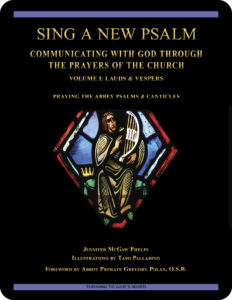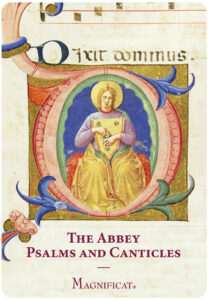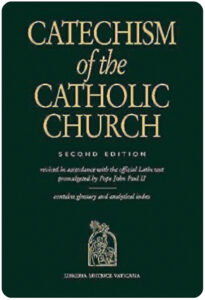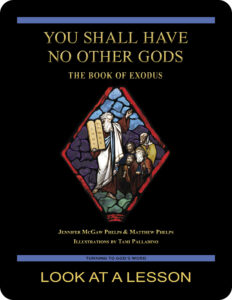 Sing a New Psalm:
Sing a New Psalm:
Communicating with God Through
the Prayers of the Church
Volume I: Lauds & Vespers
Lesson 3 You Are a Priest Forever
Psalm 110, Psalm 111, and Psalm 112
Sunday 2nd Vespers (Week I)
Revised Standard Version Catholic Edition (RSVCE)*
New American Bible Revised Edition (NABRE)*
Catechism of the Catholic Church
ex libris (in our library)
next lesson: To My Words Give Ear, O LORD
This material coordinates with Lesson 3 on pages 14–17 in Sing a New Psalm: Communicating with God Through the Prayers of the Church—Volume I: Lauds & Vespers. Our Catholic Bible study is based on The Abbey Psalms and Canticles, an English translation of the Psalms prepared by the monks at Conception Abbey in 2010 and first published as The Revised Grail Psalms. The Abbey Psalms and Canticles is a revision of that work, finished in 2020 and published by the United States Conference of Catholic Bishops (USCCB). Wording and numbering of some Psalms and verses in other translations may differ. This new translation of the Psalms in the process of being added to all English-language Liturgy of the Hours books used in the United States. The USCCB also plans a liturgical Bible based on the NABRE translation.
The Abbey Psalms and Canticles, an English translation of the Psalms prepared by the monks at Conception Abbey in 2010 and first published as The Revised Grail Psalms. The Abbey Psalms and Canticles is a revision of that work, finished in 2020 and published by the United States Conference of Catholic Bishops (USCCB). Wording and numbering of some Psalms and verses in other translations may differ. This new translation of the Psalms in the process of being added to all English-language Liturgy of the Hours books used in the United States. The USCCB also plans a liturgical Bible based on the NABRE translation.
“Unlike other prayers in sacred Scripture, the prayers contained in the Psalms are not inserted into a narrative story that specifies their meaning and function. Instead, the Psalms are given to the believer precisely as a text of prayer. Since they are the Word of God, the believer who prays the Psalms speaks to God using the very words that God himself has given to us. Thus, in praying the Psalms we learn to pray. The Psalms are a school of prayer.”—Pope Benedict XVI
welcome to our in-depth study of the Psalms
We invite groups and individuals to check out the sample first lesson from this 28- lesson Turning to
lesson Turning to  God’s Word Catholic Bible study. Our online study pages include additional questions, commentary, and prayers based on the Psalm texts. Sing a New Psalm: Communicating with God Through the Prayers of the Church—Volume I: Lauds & Vespers has been granted an imprimatur. A digital version of this study can be purchased from our website shop. Volume II: Vigils, Day Prayer & Compline is scheduled for publication in 2025. If you have a Bible-study question or comment, click on one of the “ask us your question” or “what do you think” buttons on any online study page.
God’s Word Catholic Bible study. Our online study pages include additional questions, commentary, and prayers based on the Psalm texts. Sing a New Psalm: Communicating with God Through the Prayers of the Church—Volume I: Lauds & Vespers has been granted an imprimatur. A digital version of this study can be purchased from our website shop. Volume II: Vigils, Day Prayer & Compline is scheduled for publication in 2025. If you have a Bible-study question or comment, click on one of the “ask us your question” or “what do you think” buttons on any online study page.
open with prayer
It’s always wise to begin any Bible study with prayer, whether reading the Scriptures alone or meeting with others in a discussion study group. You can pray using your own words, pray one of the Psalms in this lesson, or use one of the opening prayers on our website. We especially like the following:
Lord Jesus, you promised to send your Holy Spirit
to teach us all things.
As we read and study your word today,
allow it to touch our hearts and change our lives. Amen.
a translation difference: order versus lineage
In The Abbey Psalms and Canticles translation of Psalm 110:4, God swears an oath regarding a priest forever according to the order of Melchizedek. Another valid way of translating that passage into English is found in The Revised Grail Psalms, in which God swears an oath regarding a priest forever in the line of Melchizedek. Both translations focus on the what it is that enables Melchizedek to serve as a priest. In the Church, an order refers to the religious community whose members are in some way set apart. Such an order sometimes also is referred to as a “blessed lineage” or “sacred lineage” (as opposed to a genetic lineage). Which translation do you prefer, and why?
 what’s the significance of the order of Melchizedek?
what’s the significance of the order of Melchizedek?
This illustration by Turning to God’s Word co-founder Tami Palladino shows Melchizedek, the priest-king of ancient Salem, a settlement that eventually became known as Jerusalem. Melchizedek makes one of only two very brief Old Testament appearances in Psalm 110:4, which describes a priest forever, after the order of Melchizedek or, as the passage is translated in The Revised Grail Psalms, in the line of Melchizedek. (The second appearance is in the book of Genesis 14:17–24.) Click on Tami’s illustration (right) to enlarge it. Her original illustration is on page 15 in Sing a New Psalm: Communicating with God Through the Prayers of the Church—Volume I: Lauds & Vespers. This lesson’s title—”You Are a Priest Forever”—focuses attention on how this mysterious figure of Melchizedek sets the stage for the priesthood of Jesus Christ. You can learn more about  Melchizedek Lesson 8 The Call of Abram in our Catholic Bible study In the Beginning: The Book of Genesis. The Turning to God’s Word related Catholic Bible study The Letter to the Hebrews: An Explanation of the Mechanism of Our Salvation explains how Psalm
Melchizedek Lesson 8 The Call of Abram in our Catholic Bible study In the Beginning: The Book of Genesis. The Turning to God’s Word related Catholic Bible study The Letter to the Hebrews: An Explanation of the Mechanism of Our Salvation explains how Psalm  110:4 and other key Old Testament passages establish the superiority of the Christian faith over traditional Hebrew worship practices.
110:4 and other key Old Testament passages establish the superiority of the Christian faith over traditional Hebrew worship practices.
WHAT DO YOU THINK about fear of the LORD vs. awe?
A few years back, many catechists began replacing “fear of the LORD” (and “fear of the Lord”) with less challenging, more acceptable  language.
language.  “Awe” became a popular substitution, and recognizing the awesomeness of God is indeed an important aspect of developing an intimate relationship with God. It’s worth noting, however, that in the Psalms, the biblical authors used original words that are most closely translated as “fear of the LORD.” Psalm 111:10 highlights fear of the LORD as the beginning of wisdom, which the Psalmist appears to assume is a desirable thing. To learn more about the the linguistic roots of the phrase, read fear & awe in Lost in Translation, an online column in which Turning to God’s Word author Matthew Phelps helps readers connect with ideas expressed in the original languages of the Scriptures.
“Awe” became a popular substitution, and recognizing the awesomeness of God is indeed an important aspect of developing an intimate relationship with God. It’s worth noting, however, that in the Psalms, the biblical authors used original words that are most closely translated as “fear of the LORD.” Psalm 111:10 highlights fear of the LORD as the beginning of wisdom, which the Psalmist appears to assume is a desirable thing. To learn more about the the linguistic roots of the phrase, read fear & awe in Lost in Translation, an online column in which Turning to God’s Word author Matthew Phelps helps readers connect with ideas expressed in the original languages of the Scriptures.
 ? Consider the pros and cons of possessing wisdom. What do you think might be the greatest drawback to being thought of as wise?
? Consider the pros and cons of possessing wisdom. What do you think might be the greatest drawback to being thought of as wise?
? Solomon is the biblical figure most frequently associated with the idea of wisdom. Refer to the First Book of the Kings 3:1–28 to describe how Solomon received wisdom and the ways in which it served him.
? Then refer to the First Book of the Kings 11:1–13 to learn what about Solomon’s life displeased God. What explanation can you offer for why all of Solomon’s wisdom failed to prevent him from eliciting God’s anger? Learn more about the life of Solomon in Lesson 23 Solomon’s Struggle for Succession through Lesson 28 The United Kingdom Dies with Solomon in the Turning to God’s Word Catholic Bible study The United Kingdom of Israel: Saul, David & Solomon Foreshadow Christ the King.
prevent him from eliciting God’s anger? Learn more about the life of Solomon in Lesson 23 Solomon’s Struggle for Succession through Lesson 28 The United Kingdom Dies with Solomon in the Turning to God’s Word Catholic Bible study The United Kingdom of Israel: Saul, David & Solomon Foreshadow Christ the King.
? How might awe be related to wisdom?
? Consider how it is that fear of the LORD can lead to wisdom.
? Who’s the wisest person that you know?
? What can you learn from that person?
 the popes inspire us—docility is the root of hope
the popes inspire us—docility is the root of hope
Don’t miss reading the papal commentary “Beatitude” on page 17 in Sing a New Psalm: Communicating with God Through the Prayers of the Church—Volume I: Lauds & Vespers. In a reflection from one of his general audiences, Pope Benedict XVI shares what he understands the term “fear of the LORD” to mean for Christians. The Holy Father also teaches about the particular blessing promised in Psalm 112 for the person who fears the LORD.
 blessed—you could look it up in our archives
blessed—you could look it up in our archives
The concept of being blessed that appears in many of the Psalms and elsewhere in the Bible originally referred to more than kind words. Learn the meaning of the word “blessed” by reading Lost in Translation, an online column in which Turning to God’s Word author Matthew Phelps helps readers connect with ideas expressed in the original languages of the Scriptures. New Lost in Translation entries are posted on Mondays, and past entries are archived on our website. Contact us if you’d like to receive Lost in Translation by email every week.
the importance of just & upright behavior
In Psalm 112:4, the Psalmist praises the justice practiced by the upright who fear the LORD. The importance God places on just behavior permeates the Psalms. The word justice derives from the Greek language, but the Hebrew word for justice carries a slightly different shade of meaning. You can learn more by reading the vocabulary box “Justice” on page 17 in Sing a New Psalm: Communicating with God Through the Prayers of the Church—Volume I: Lauds & Vespers.
t he best Catholic commentary about Scripture
he best Catholic commentary about Scripture
To find out more about how Church teaching is supported by passages in Sing a New Psalm: Communicating with God Through the Prayers of the Church—Volume I: Lauds & Vespers, check out the Index of Citations in the Catechism of the Catholic Church. Links (Revised Standard Version Catholic Edition [RSVCE*]) to the primary Scripture passages in the lesson and relevant paragraphs in the Catechism are provided here. Not every passage in the biblical text for this study is referenced in a Catechism paragraph, however, including Psalm 112 in this lesson.
Psalm 110:1—paragraph 447
Psalm 110:1–7—paragraph 659
Psalm 110:4—paragraph 1537
Psalm 111:9—paragraph 2807
don’t forget about our indexes & extra online material

 If you’re trying to locate information about a specific Scripture passage, you can look it up in the index at the back of the study book or sample lesson. If you want to find a particular commentary, you can look up its title in the topics index. To learn more about another book of the Bible for which there’s a Turning to God’s Word study, visit the online study directories to read the commentaries and watch any accompanying videos. Finally, if you have a question or would like to make a comment about any of our studies, you can use one of the “ask us your question” or “what do you think” buttons to email our authors.
If you’re trying to locate information about a specific Scripture passage, you can look it up in the index at the back of the study book or sample lesson. If you want to find a particular commentary, you can look up its title in the topics index. To learn more about another book of the Bible for which there’s a Turning to God’s Word study, visit the online study directories to read the commentaries and watch any accompanying videos. Finally, if you have a question or would like to make a comment about any of our studies, you can use one of the “ask us your question” or “what do you think” buttons to email our authors.
ex libris—Church documents & books about religious topics
Link to magisterial documents referred to in our Bible studies at ex libris—magisterial documents.  This listing includes significant recent encyclicals as well as a number of historical Church documents. Recommended books related to Scripture study can be found at ex libris—main bookshelf.
This listing includes significant recent encyclicals as well as a number of historical Church documents. Recommended books related to Scripture study can be found at ex libris—main bookshelf.
wondering how to pronounce some of these words?
The following links are to readings from the New International Version (NIV) Bible. To listen, open one of the links and click on the audio icon above the printed text. Although not taken from the translations used in our study materials, the NIV readings provide an audio guide to pronunciation of words in this lesson’s primary biblical texts. A close online version of the translation of the Bible used in Catholic liturgy in the United States as well as an audio guide for daily Mass readings for the current month can be found on the website of the United States Conference of Catholic Bishops (USCCB).
Psalm 110 (NIV)
Psalm 111 (NIV)
Psalm 112 (NIV)
 close with a Psalms-based prayer for Sunday 2nd Vespers (Week I)
close with a Psalms-based prayer for Sunday 2nd Vespers (Week I)
Many of our Catholic study groups like to conclude their discussions with a prayer based on the scriptural focus of their lesson. If you’re uncomfortable composing your own Bible-based prayers, you can follow our four easy steps. If you prefer, you can pray any of the Psalms in this lesson, or you can use the following short prayer.
O God, you are judge and ruler of all nations.
Bring about an increase in wisdom and peace in our world
through an increase in respect for your divine power.
Grant us steadfast hearts that we may never neglect
to praise your majestic and glorious deeds.
We ask this in the name of Jesus Christ,
who will come to judge the living and the dead. Amen.
Lesson 4 To My Words Give Ear, O LORD, Monday Lauds (Week I)—Psalm 5 and Psalm 19
Lesson 2 O God, at Dawn I Seek You, Sunday Lauds (Week I)—Psalm 63, Psalm 93, and Psalm 149
you also may like our study of the book of Exodus
 You Shall Have No Other Gods: The Book of Exodus, a 28-lesson Catholic Bible study with an imprimatur, provides an in-depth look at how significant events in biblical history that occurred thousands of years ago to descendants of Jacob remain relevant and even critical for present-day Christians to understand. The deliverance of the Hebrews from slavery in Egypt and the giving of Ten Commandments are examined along with the development of Moses’ relationship to God. Click on the book’s cover to view a sample lesson.
You Shall Have No Other Gods: The Book of Exodus, a 28-lesson Catholic Bible study with an imprimatur, provides an in-depth look at how significant events in biblical history that occurred thousands of years ago to descendants of Jacob remain relevant and even critical for present-day Christians to understand. The deliverance of the Hebrews from slavery in Egypt and the giving of Ten Commandments are examined along with the development of Moses’ relationship to God. Click on the book’s cover to view a sample lesson.
start a Turning to God’s Word Bible study
Thank you for your interest in Sing a New Psalm: Communicating with God Through the Prayers of the Church—Volume I: Lauds & Vespers. 
 More information about beginning a Turning to God’s Word Bible study can be found on this website at start a Bible study, and Tami, Matthew, and I are available to answer questions or discuss concerns. Contact us to start this or one of our other studies or to have your schedule listed with other TtGW study groups on our website. —Jennifer
More information about beginning a Turning to God’s Word Bible study can be found on this website at start a Bible study, and Tami, Matthew, and I are available to answer questions or discuss concerns. Contact us to start this or one of our other studies or to have your schedule listed with other TtGW study groups on our website. —Jennifer
*There are seven deuterocanonical books in the Old Testament—the Books of Tobit, Judith, Wisdom, Sirach, Baruch, and First and Second Maccabees, as well as some passages in the Books of Esther and Daniel. Protestants usually refer to these works as “apocryphal,” a word that means “outside the (Protestant) canon” because they’re excluded from most Protestant Bibles. The word “deuterocanonical” means “second canon”; Catholics use that word to refer to any section of the Catholic Old Testament for which there are no extant, or existing, Hebrew manuscripts. All of the deuterocanonical books appear in the Septuagint, the earliest remaining versions of which date to the 1st century B.C. This Greek translation of the Old Testament was in common use by Jews at the time of Jesus—but the same books aren’t found in existing Hebrew manuscripts, which aren’t as old as the oldest version of the Septuagint. Learn more by reading How Do Catholic & Protestant Bibles Differ?
Turning to God’s Word printed Bible studies use the 2006 Revised Standard Version Second Catholic Edition (RSV2CE) translation for all Scripture references except the Psalms, which are taken from The Abbey Psalms and Canticles, prepared by the monks of Conception Abbey and published in 2020 by the United States Conference of Catholic Bishops (USCCB). All Scripture links for the online study pages for Sing a New Psalm: Communicating with God Through the Prayers of the Church—Volume I: Lauds & Vespers are to the 1966 Revised Standard Version Catholic Edition (RSVCE) translation. The New International Version (NIV) audio recordings follow the same chapter and verse numbering as the RSV Catholic translations, but the NIV doesn’t include the deuterocanonical passages.
The 1966 RSVCE uses archaic pronouns and verb forms such as “thee,” “thou,” “didst” in the Psalms and in direct quotations attributed to God. The 2006 RSV2CE replaces those with more accessible English. The few significant translation changes in the RSV2CE include rendering almah as “virgin” in the Book of Isaiah 7:14 and restoring the term “begotten” in the Gospel According to John 3:16.
The Psalms in this Bible study reflect numbering used in The Abbey Psalms and Canticles; Psalms numbering may vary in other translations. Numbering also may vary for a few other passages in this Bible study. Turning to God’s Word studies follow the numbering in the Revised Standard Version Catholic translations (RSVCE and RSV2CE). Discrepancies in the New American Bible Revised Edition (NABRE) are noted in the Index of Scripture Citations in the study book and the online sample.
 The companion to this Catholic Bible study from Turning to God’s Word, Sing a New Psalm: Communicating with God Through the Prayers of the Church—Volume II: Vigils, Day Prayer & Compline, will cover Psalms not included in Volume I: Lauds & Vespers. Volume II: Vigils, Day Prayer & Compline is scheduled for publication in 2025.
The companion to this Catholic Bible study from Turning to God’s Word, Sing a New Psalm: Communicating with God Through the Prayers of the Church—Volume II: Vigils, Day Prayer & Compline, will cover Psalms not included in Volume I: Lauds & Vespers. Volume II: Vigils, Day Prayer & Compline is scheduled for publication in 2025.
